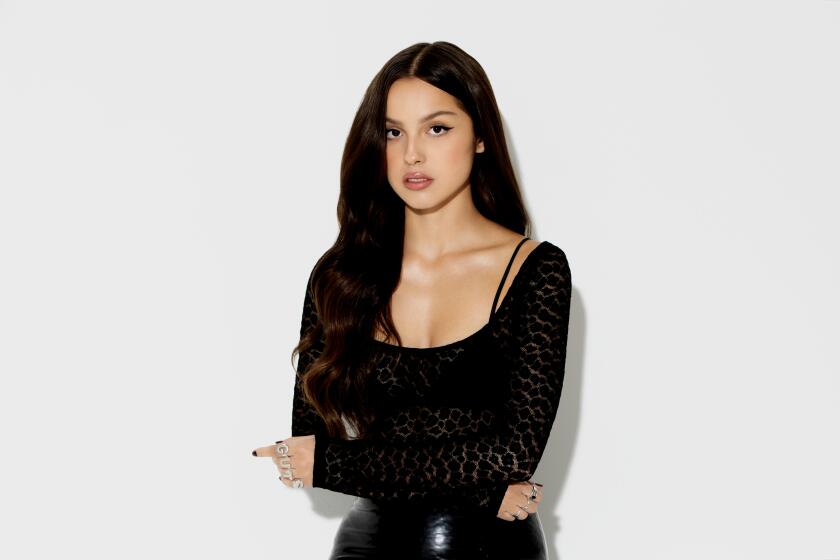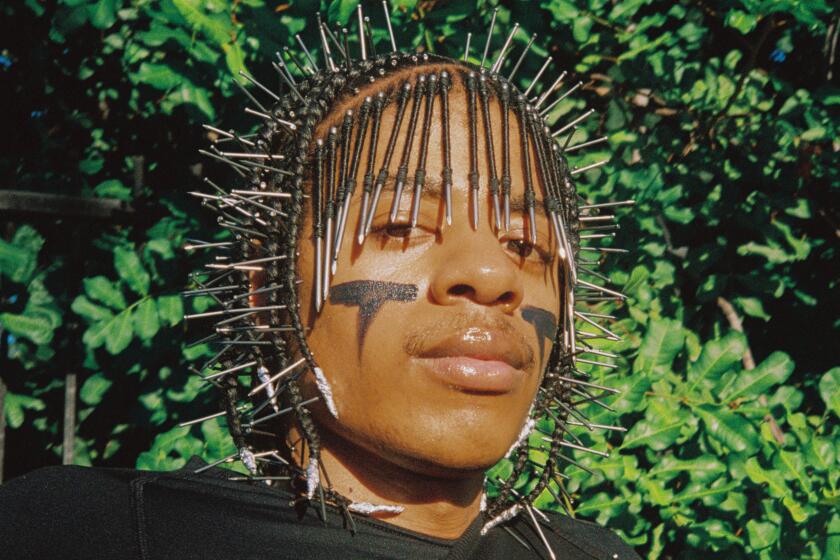An L.A. hardcore band champions Black power and transcendence, in a scene not known for either
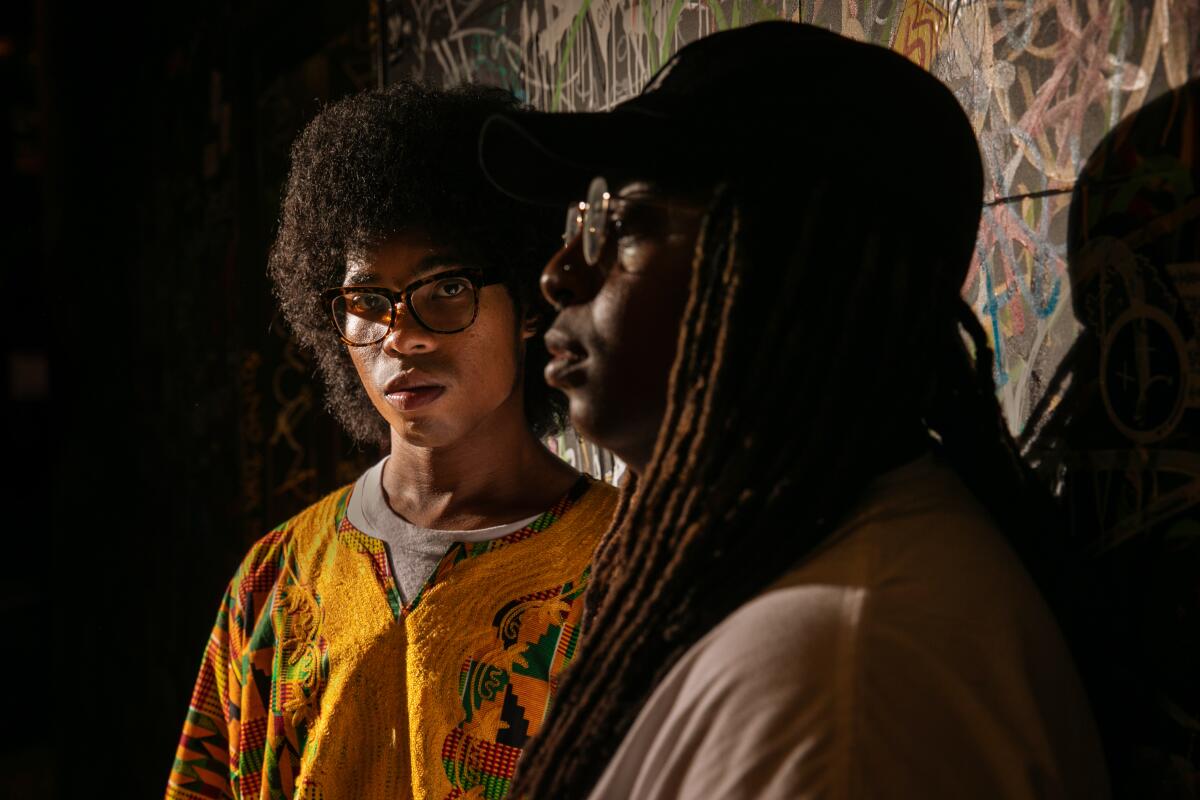
- Share via
In late July, an afternoon heatwave seared the grimy blacktop outside the downtown L.A. music venue 1720.
Zulu, an ambitious 4-year-old L.A. hardcore band, wouldn’t perform for many hours. Yet dozens of mostly Black and Latin kids with ear gauges and neck tats snaked around the building, enduring miserable temperatures while the 10 freeway roared above them. It was worth it to get a pit spot to watch one of L.A.’s most ferocious bands tear the room apart.
Under an awning in the venue’s load-in dock, Zulu vocalist-multi-instrumentalist Anaiah Rasheed Sayyid Hadi Muhammad, 26, and guitarist Dez Yusuf, 33, sweated on a break from hauling gear. Muhammad, dressed in a kente-patterned tunic, and Yusuf, with long locs and tooth jewelry, chugged water as they ramped up for one of the biggest shows of their lives.
“Many of us, especially in this type of music, have felt some sort of alienation,” Yusuf said, referencing his Black bandmates. “But what we found is there are a lot of people who share that feeling.”
Olivia Rodrigo’s flair for melodrama has grown only more vivid since 2021 ‘Drivers License,’ as has her ability to craft a rock sound all her own.
Zulu, which headlines the Roxy on Sept. 15, is uncompromising toward both the mainstream music industry and the underground’s cultural blind spots. Yet to the heaving, sold-out crowd at the 750-capacity 1720, Zulu were already stars.
Fans knew every throat-ripping lyric to songs like “Where I’m From” and “Life Az a Shorty Shun B So Ruff.” They circle-pitted to bloody-knuckle breakdowns — the band take its style from a niche corner of punk called “powerviolence,” defined by grueling tempos and shrieked vocals — and ruminated over the ambient passages that make Zulu’s March debut LP, “A New Tomorrow,” so arresting.

If a hardcore-aligned band like Turnstile can get a Grammy nomination, while acts like Demi Lovato and Tyler, the Creator nod to punk subcultures on arena stages, can a band as challenging as Zulu get much, much bigger?
“One time I was walking in Pasadena, I was at a light and this guy almost jumped out of his car yelling, ‘Zulu! Zulu!’ Not even my name, just ‘Zulu’,” Muhammad laughed. “I was like, ‘Man, you’re out of your window, you need to drive.”
Zulu takes its name from the Black South African resistance army that fought British colonizers in the 19th century. The band has roots across the South Bay and Northeast L.A.’s backyard punk and rap scenes. Muhammad found early success in the mid-2010s as a teenager drumming in his Glendale garage-punk band the Bots with his older brother Mikaiah. The act played festivals like Coachella and Bonnaroo but was acutely aware of its outsider-dom at many punk shows.
“As I got older, actually going to shows, I was surprised — like, ‘Oh, I thought this scene is supposed to be open to everyone,’” Muhammad said.
Meanwhile, Yusuf co-founded the gothic Long Beach hip-hop duo Crimewave 5150, whose warehouse shows were famously chaotic. Punk and rap intermingled freely in his scene. “It felt like, ‘Oh, these people are speaking my language,’” Yusuf said.
Muhammad first conceived of Zulu in 2019 as a home-produced project that could slice Nina Simone and Curtis Mayfield samples into the gaps between raging blast beats. A hopeful Black-power solidarity underpinned his lyrics, sometimes aimed at the police violence that spurred the George Floyd street protests.
But when the pandemic hit, Muhammad was stuck at home and uncertain when he’d have a full band again. “I’ll keep it real. It was a rough time,” he said. “It wasn’t even an idea that I could do it on my own. I was always in someone else’s band.”
Teezo Touchdown is already a favorite of Drake, Tyler, the Creator and Travis Scott. Now, with his striking look and a debut LP, he’s ready to seize the spotlight.
Muhammad soon recruited his bandmates through local punk scenes, a long process for a group prioritizing Black members. From the band members first conversations together, ”We spoke about exploring things like love and joy and not just focusing on pain and sorrow,” Yusuf said. “We all wanted to be in a band like this, where it’s not just focused on hardcore and with a spectrum of expression.”
Muhammad brought in guitarist Braxton Marcellous, 28, bassist Satchel Brown, 25, and drummer Christine Cadette to round out a vicious, technically exacting lineup. (Cadette is no longer with the group.) Yet the band’s songs aspired to something more transcendent. “Where I’m From” and “From Tha Gods to Earth” are scabrous and violent, usually getting their licks in less than two minutes. Yet Zulu’s songwriting longs for African diaspora solidarity or a movement like the band’s namesake to assert its place in America. “You wouldn’t be here if it wasn’t for us,” Zulu yells on “Where I’m From.” “I will not bruise / I don’t gotta run.”
“There have been bands like Bad Brains, Candiria and Fishbone, with black vocalists talking about this stuff, but Zulu has really turned heavy music upside down,” said Edward Banchs, a music scholar who wrote “Scream for Me, Africa!,” a book about African heavy-metal culture in the post-colonial era. “That’s what this music needs. They’re going to start a conversation that hardcore has needed for some time.”
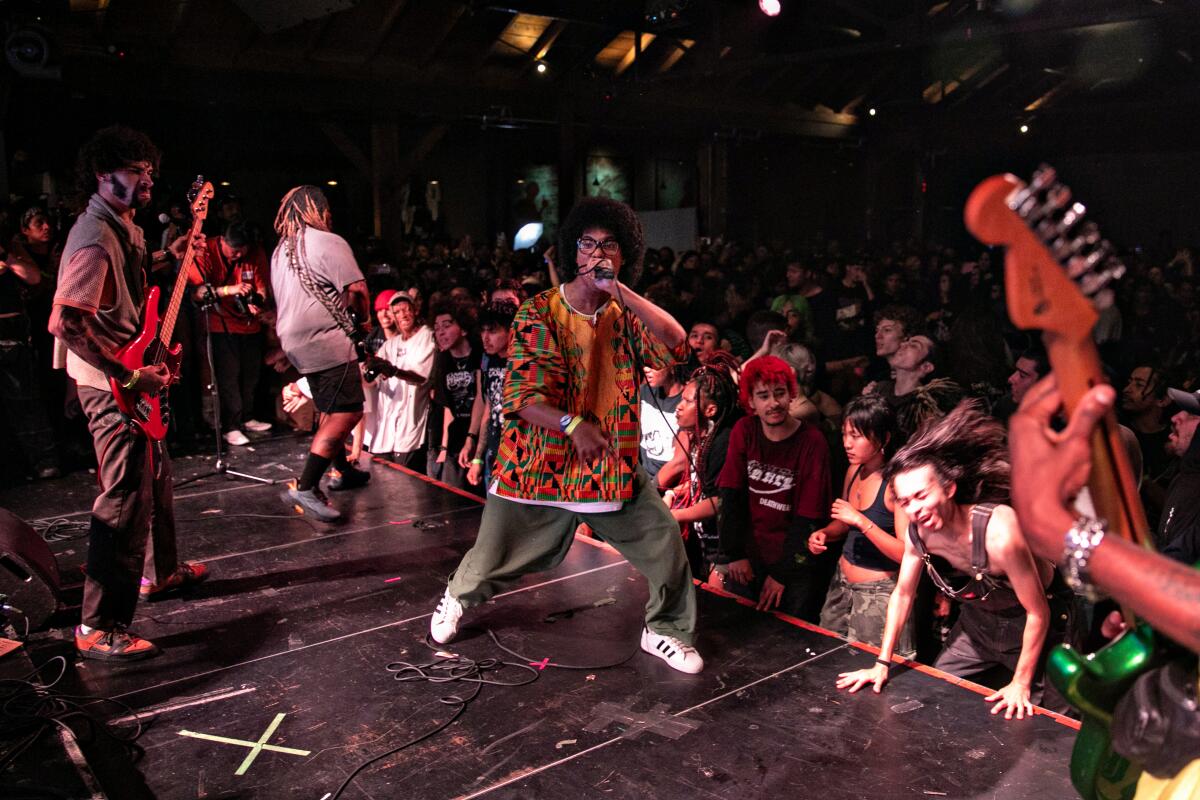
But for all the record’s joint-snapping rages, the spiritual centerpiece of the LP is “Crème de Cassis,” a spoken-word poem from band friends Aleisia Miller and Precious Tucker over a regal jazz piano. “Why is Black discourse always about precipitation,” they intone, “While ignoring the sweet scent of petrichor after rain.”
“I used to not want to be poetic about it, but all the samples and the artwork get our message across without having to say it bluntly,” Muhammad said. “Everyone expects us to be so outright about our politics.”
Zulu sometimes is more overt, as when the group released an infamous merch shirt imploring fans to “Abolish White Hardcore.” It was obviously a joke aimed at blinkered white punks. But the band’s members were shocked at the hate mail that poured in.
“We got death threats from people that thought they were anti-racist,” Yusuf said. ”A lot of times, it’s almost like they want us to be some blown-out-of-proportion angry band. But I was talking to my therapist about displaying anger, and she was like, ‘True power is doing exactly what you want despite anyone else’s efforts to stop it.’”
Still, Pitchfork and NPR gave “A New Tomorrow” rave reviews, and the band is on the radar of Coachella promoter Goldenvoice, which booked them for the Roxy gig with the like-minded Philadelphia group Soul Glo. Avant-garde comedian Eric André joined them for the “Where I’m From” video, which riffed on A Tribe Called Quest’s “Scenario” clip.
While the members of Zulu are reticent to talk about their private lives and how success is changing things, Muhammad recently decided to go by his full Muslim name in the context of the band, to better reflect his Islamic faith. “I never cared to talk about it publicly before,” he said. “But I want to share my identity more, rather than keep it private.”
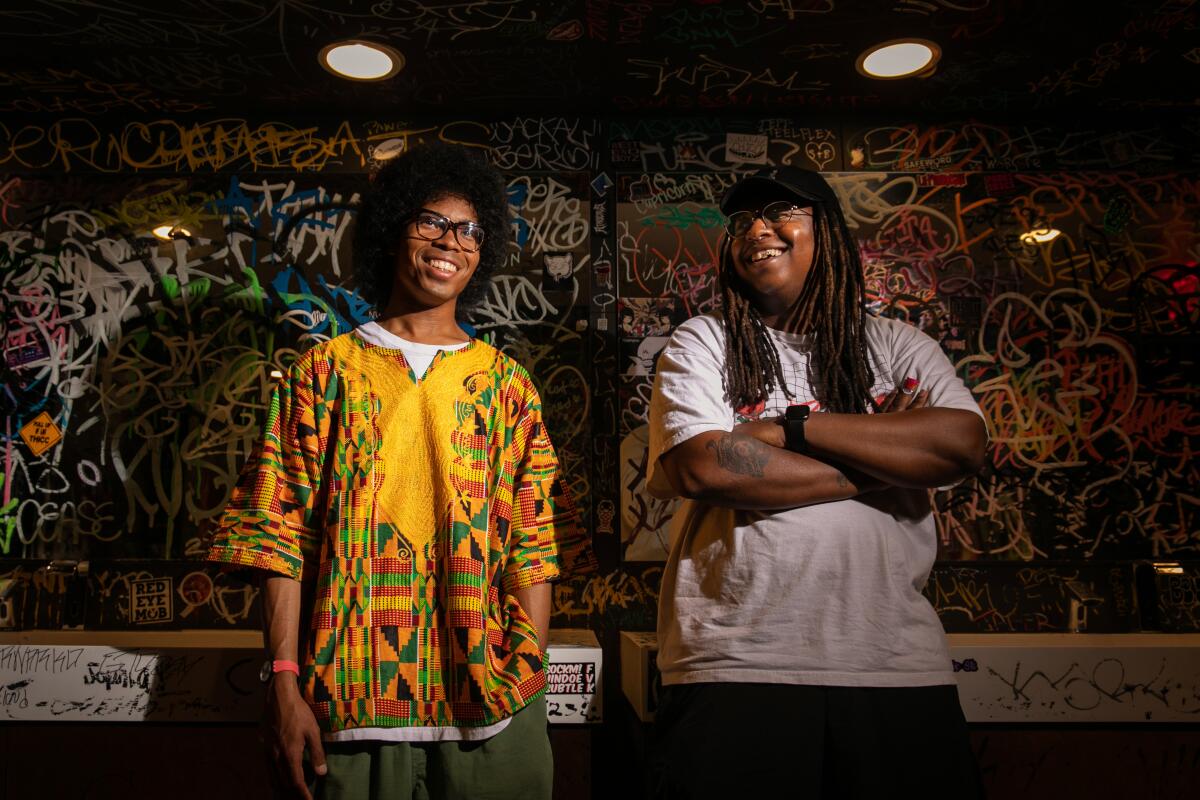
Zulu is signed to the Baltimore and New York-based indie label Flatspot, home to many promising punk bands of color like Chicago’s Buggin and Australia’s Speed. Zulu is wary about which music-industry institutions — major labels, big talent agencies, festival bookers — may come calling next. “I do have issues with playing some bigger things. There’s such a classism within it all,” Yusuf said.
“When someone tries to help us, it’s like, ‘I don’t know if you can help, and we don’t know how to help you,’” Muhammad said. “People have avoided us because of it. It’s a blessing and a curse to have ethics.”
After returning to L.A. following a near-fatal career setback, Chappell Roan came out, reinvented herself as a horny pop diva and became one of 2023’s rising stars.
For all of underground music’s genuflecting to progressive values, Zulu asks for a lot of self-reflection from its audience. Some metal and punk fans might not want to follow the band there.
“There’s a certain line that’s hard to cross when you play heavy music,” Banchs said. “Fishbone ran into this in the ’90s, where the mainstream didn’t respond well to a Black band selling shirts saying, ‘F— racism.’ But Zulu is in a different era. I think the time is right for this band.”
The months to come will be focused on getting new fans to see the band where it thrives — live, atop a churning pit. Still, Muhammad is cautious about what kind of attention new crowds might bring.
“It’s cool that people appreciate our music. But I didn’t do this to be idolized,” he said. “The entire point is to build a community of people. I never want to be looked at like that.”
More to Read
The biggest entertainment stories
Get our big stories about Hollywood, film, television, music, arts, culture and more right in your inbox as soon as they publish.
You may occasionally receive promotional content from the Los Angeles Times.
